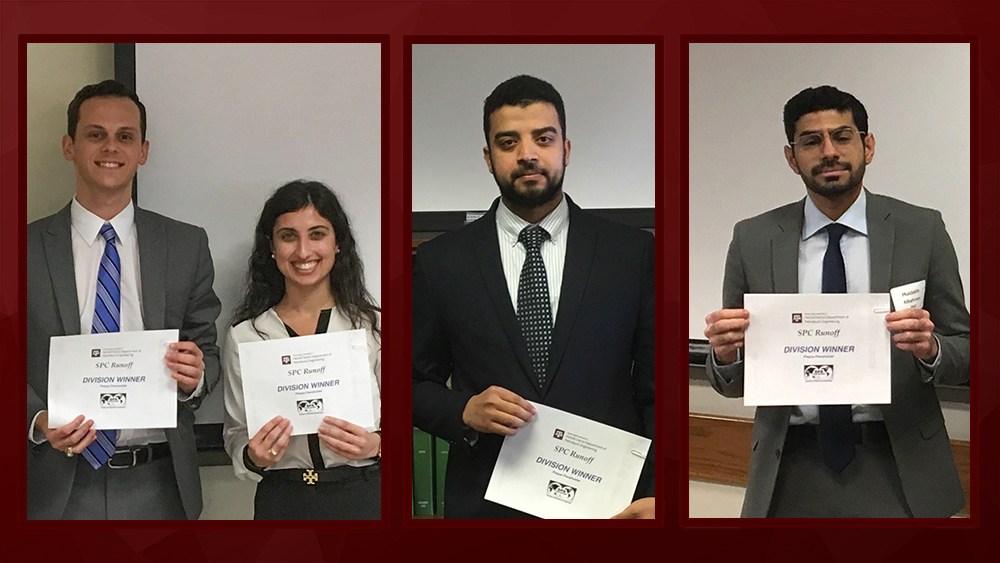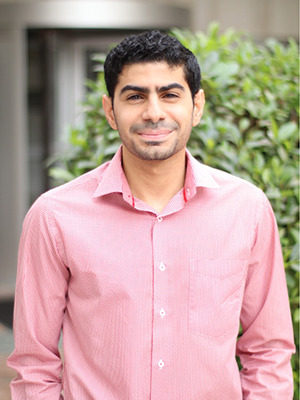
Several petroleum engineering students from Texas A&M University placed high in the Society of Petroleum Engineers (SPE) Gulf Coast Regional Student Paper Contest.
Hussain AlBahrani won first place in the Ph.D. division and will represent Texas A&M in the SPE International Student Paper Contest later this year. Ahmed Elkady took second place in the regional master's division. Gabrielle Joubran and Steven Winn took second and third place respectively in the undergraduate division.
The SPE Gulf Coast contest regional competition, held in April, was virtual due to travel restrictions and pandemic fears. In contrast, the local Harold Vance Department of Petroleum Engineering student paper contest in January was live, and very well received by both industry judges and faculty. Hundreds of students had the opportunity to gather on campus, give their technical presentations before judges and peers, receive questions and feedback on their research, and have the chance to listen and interact on a large scale. Regional paper competitions are usually far smaller, only featuring top students who take first and second place in local undergraduate, master's or Ph.D. divisions, yet there is still a chance to receive feedback and hear other student presentations. Going to an online format meant regional organizers had to narrow contestant experiences down to a minimum.
AlBahrani, Elkady and Joubran took the time to share their thoughts on competing virtually and the student paper contest in general by answering a few questions.
Q: What was it like to compete remotely as compared to the live competition held on campus?
Joubran: We only logged in during our specific time and we were not allowed to listen in on other people, whereas on campus we listened to others.
Elkady: I definitely prefer the in-person contest like the one we had in the department, but obviously a remote contest was the preferred choice due to the pandemic.
AlBahrani: I felt less stress and nervousness than with the in-person presentations in the local competition. SPE did a great job in planning as I was able to communicate my research, both audibly and visually, without a glitch. The discussion with the judges was also smooth. I was able to interact with them clearly.
Elkady: I suffered from some technical difficulties. The judges couldn’t hear three minutes from my presentation recording although I prepared it beforehand and it didn’t have any problems.
AlBahrani: SPE informed us that the quality of the presentations was not a part of the evaluation process, which I believed balanced things.
Q: Did you get more feedback from the judges, or less?
Elkady: I received questions about my work but, unlike the in-person contest, I didn't get feedback or recommendations.
Joubran: The questions I got from the judges weren't as technical as the questions I got when I presented on campus.
AlBahrani: I have to say that the questions I received during our school local competition prepared me very well for the discussion with the judges in the regional competition as they were very similar and focused on the same points.
Q: Will this experience help you in your future?
AlBahrani: Participating in the competition has definitely been a rewarding experience. Not only was I provided with an opportunity to present and validate the new ideas of my research to different panels of industry experts, but I was also able to test my performance under pressure.
Joubran: I feel like the contest is a valuable tool because it allows you to practice public speaking and present over a technical topic. I had a lot of practice while at Texas A&M. These experiences have helped me become more confident when I am speaking in front of others and help me better express my ideas in a work setting.
Elkady: I gained a lot of experience and self-confidence from participating and being asked my research details. I was directed to some adjustments and additions that will hopefully improve and strengthen my work.
Q: What are your hopes for your career?
Joubran: I am going to graduate in December 2020, and I hope to secure a full-time job by then.
AlBahrani: I also will be graduating in December 2020. Since I'm a sponsored student, the validation I received from my participation in the competition gives me more support to present my research to the management of my sponsoring company, Saudi Aramco. As for my career, I anticipate working in research and development for the foreseeable future.
Elkady: I hope to graduate this summer. I plan to continue doing graduate studies by joining the Ph.D. program in petroleum engineering, and to eventually achieve my dream of being a successful researcher and professor.